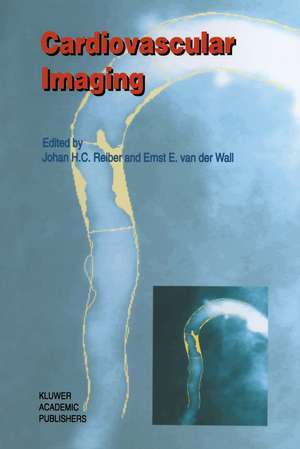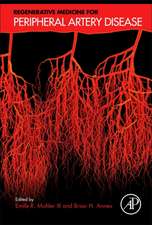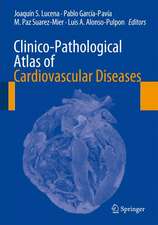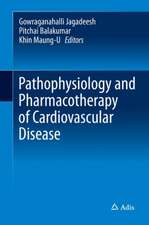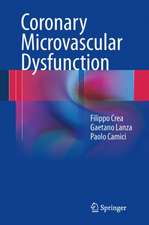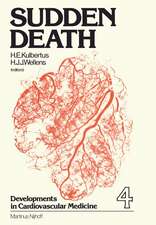Cardiovascular Imaging: Developments in Cardiovascular Medicine, cartea 186
Editat de Johan H. C. Reiber, Ernst E. van der Wallen Limba Engleză Paperback – 28 sep 2011
For all these imaging modalities, the application of dedicated quantitative analytical software packages enables the evaluation of the imaging studies in a more accurate, reliable, and reproducible manner. These extensions and achievements have resulted in improved diagnostics and subsequently in improved patient care. Particularly in patients with ischaemic heart disease, major progress has been made to detect coronary artery disease in an early phase of the disease process, to follow the atherosclerotic changes in the coronary arteries, to establish the functional and metabolic consequences of the luminal obstructions, and accurately to assess the results of interventional therapy.
Aside from all these high-tech developments in cardiac imaging techniques, the transition from the analogue to the digital world has been going on for some time now. For the future, it has been predicted that the CD-R will be the exchange medium for cardiac images and DICOM-3 the standard file format. This has been a major achievement in the field of standardization activities. Since these developments will have a major impact on the way images willbe stored, reviewed and exchanged in the near future, an important part of this book has been dedicated to DICOM and the filmless catheterization laboratory.
Cardiovascular Imaging will assist cardiologists, radiologists, nuclear medicine physicians, image processing specialists, physicists, basic scientists, and fellows in training for these specialties to understand the most recent achievements in cardiac imaging techniques and their impact on cardiovascular medicine.
Din seria Developments in Cardiovascular Medicine
- 5%
 Preț: 1484.50 lei
Preț: 1484.50 lei - 5%
 Preț: 375.17 lei
Preț: 375.17 lei - 5%
 Preț: 354.10 lei
Preț: 354.10 lei - 5%
 Preț: 1419.03 lei
Preț: 1419.03 lei - 5%
 Preț: 376.43 lei
Preț: 376.43 lei - 5%
 Preț: 1098.27 lei
Preț: 1098.27 lei - 5%
 Preț: 1438.38 lei
Preț: 1438.38 lei - 5%
 Preț: 376.78 lei
Preț: 376.78 lei - 5%
 Preț: 368.37 lei
Preț: 368.37 lei - 5%
 Preț: 380.25 lei
Preț: 380.25 lei - 5%
 Preț: 2117.58 lei
Preț: 2117.58 lei - 5%
 Preț: 367.28 lei
Preț: 367.28 lei - 5%
 Preț: 366.56 lei
Preț: 366.56 lei - 5%
 Preț: 371.10 lei
Preț: 371.10 lei - 5%
 Preț: 370.94 lei
Preț: 370.94 lei - 5%
 Preț: 783.18 lei
Preț: 783.18 lei - 5%
 Preț: 713.18 lei
Preț: 713.18 lei - 5%
 Preț: 1098.27 lei
Preț: 1098.27 lei - 5%
 Preț: 375.49 lei
Preț: 375.49 lei - 5%
 Preț: 373.47 lei
Preț: 373.47 lei - 5%
 Preț: 723.93 lei
Preț: 723.93 lei - 5%
 Preț: 1104.13 lei
Preț: 1104.13 lei - 5%
 Preț: 2117.20 lei
Preț: 2117.20 lei - 5%
 Preț: 716.09 lei
Preț: 716.09 lei - 5%
 Preț: 372.03 lei
Preț: 372.03 lei - 5%
 Preț: 722.33 lei
Preț: 722.33 lei - 5%
 Preț: 660.07 lei
Preț: 660.07 lei - 5%
 Preț: 375.34 lei
Preț: 375.34 lei - 5%
 Preț: 1423.22 lei
Preț: 1423.22 lei - 5%
 Preț: 715.35 lei
Preț: 715.35 lei - 5%
 Preț: 790.69 lei
Preț: 790.69 lei - 5%
 Preț: 720.68 lei
Preț: 720.68 lei - 5%
 Preț: 3185.49 lei
Preț: 3185.49 lei - 5%
 Preț: 1418.27 lei
Preț: 1418.27 lei - 5%
 Preț: 784.64 lei
Preț: 784.64 lei - 5%
 Preț: 714.63 lei
Preț: 714.63 lei - 5%
 Preț: 370.74 lei
Preț: 370.74 lei - 5%
 Preț: 376.22 lei
Preț: 376.22 lei - 5%
 Preț: 660.85 lei
Preț: 660.85 lei - 5%
 Preț: 368.37 lei
Preț: 368.37 lei
Preț: 385.57 lei
Preț vechi: 405.87 lei
-5% Nou
Puncte Express: 578
Preț estimativ în valută:
73.78€ • 77.03$ • 61.06£
73.78€ • 77.03$ • 61.06£
Carte tipărită la comandă
Livrare economică 04-18 aprilie
Preluare comenzi: 021 569.72.76
Specificații
ISBN-13: 9789401066167
ISBN-10: 9401066167
Pagini: 604
Ilustrații: XXI, 578 p.
Dimensiuni: 160 x 240 x 32 mm
Greutate: 0.84 kg
Ediția:Softcover reprint of the original 1st ed. 1996
Editura: SPRINGER NETHERLANDS
Colecția Springer
Seria Developments in Cardiovascular Medicine
Locul publicării:Dordrecht, Netherlands
ISBN-10: 9401066167
Pagini: 604
Ilustrații: XXI, 578 p.
Dimensiuni: 160 x 240 x 32 mm
Greutate: 0.84 kg
Ediția:Softcover reprint of the original 1st ed. 1996
Editura: SPRINGER NETHERLANDS
Colecția Springer
Seria Developments in Cardiovascular Medicine
Locul publicării:Dordrecht, Netherlands
Public țintă
ResearchCuprins
One: Major Advances in Interventional Cardiology.- 1. The Changing Role of High Speed Rotational Atherectomy in The Present and Future Practice of Coronary Intervention.- 2. The AVE Micro Stents™.- 3. Non-Surgical Septum Reduction in Hypertrophic Cardiomyopathy.- Two: Coronary quantitation by QCA and intracoronary ultrasound (ICUS).- 4. State of the art in quantitative coronary arteriography as of 1996.- 5. 3-D Coronary angiography for quantitative analysis of coronary morphology.- 6. State of the art in ICUS quantitation.- Three: Regression/progression of CAD and cardiovascular imaging.- 7. Imaging atherosclerosis: lesion vs. lumen.- 8. An Overview of fluvastatin clinical trials.- 9. Lessons learned from angiographic coronary atherosclerosis trials.- 10. Regression/progression in women: the estrogen angiographic trials.- 11. Is peripheral B-mode ultrasound a substitute for coronary arteriography?.- Four: DICOM and The Filmless Catheterization Laboratory.- 12. The Digital catheterization laboratory - is it Practical Today?.- 13. The role of DICOM in the digital catheterization laboratory.- 14. Philips CD-Medical - a new era in digital cardiac review, exchange and archiving.- 15. Status of the GE approach to the digital catheterization laboratory.- 16. Requirements for cardiac interchange media and the adoption of recordable CD.- 17. Status of the Camtronics approach to the digital catheterization laboratory.- 18. The approach at the German Heart Institute in Berlin - the BERMED-System.- 19. Archival systems for cineangiographic film replacement.- Five: Progress in intracoronary ultrasound (ICUS).- 20. What are the advantages and limitations of three-dimensional intracoronary ultrasound imaging?.- 21. New developments in intracoronary ultrasound.- 22. Practicalintegration of intravascular ultrasound imaging into the cardiac catheterization laboratory.- 23. Intravascular ultrasound for evaluation of coronary arteries.- Six: Magnetic Resonance (MR) Coronary Imaging.- 24. To which extent can the coronary artery tree be imaged and quantified with the current MR technology?.- 25. Flow measurements in coronary arteries using MRI.- 26. Current and future applications of magnetic resonance coronary angiography.- 27. Advantages and limitations of coronary MR angiography.- Seven: Angioscopy.- 28. Color quantization in angioscopic images.- 29. The use of coronary angioscopy in diagnosis and clinical decision making.- Eight: Coronary flow and flow reserve.- 30. Current status and future expectations of the flow velocity guidewire.- 31. Coronary pressure measurements and myocardial fractional flow reserve for clinical decision making in the catheterization laboratory.- 32. Functional assessment of stenosis significance after coronary arteriography; value of myocardial perfusion scintigraphy.- 33. Blood flow measurements using 3D distance-concentration functions derived from digital x-ray angiograms.- Nine: Myocardial perfusion.- 34. On-line assessment of myocardial flow reserve.- 35. Intravenous myocardial contrast echocardiography for myocardial perfusion.- 36. Newer imaging techniques in contrast echocardiography.- 37. Myocardial perfusion and function by MR imaging techniques.- 38. Myocardial perfusion imaging by SPECT.- 39. Myocardial blood flow quantitation with positron emission tomography.- Ten: Cine and spiral CT coronary imaging.- 40. What is the current role of ultrafast CT in coronary imaging?.- 41. Assessment of the coronary arteries with electron beam computed tomography.- Colour Section.
